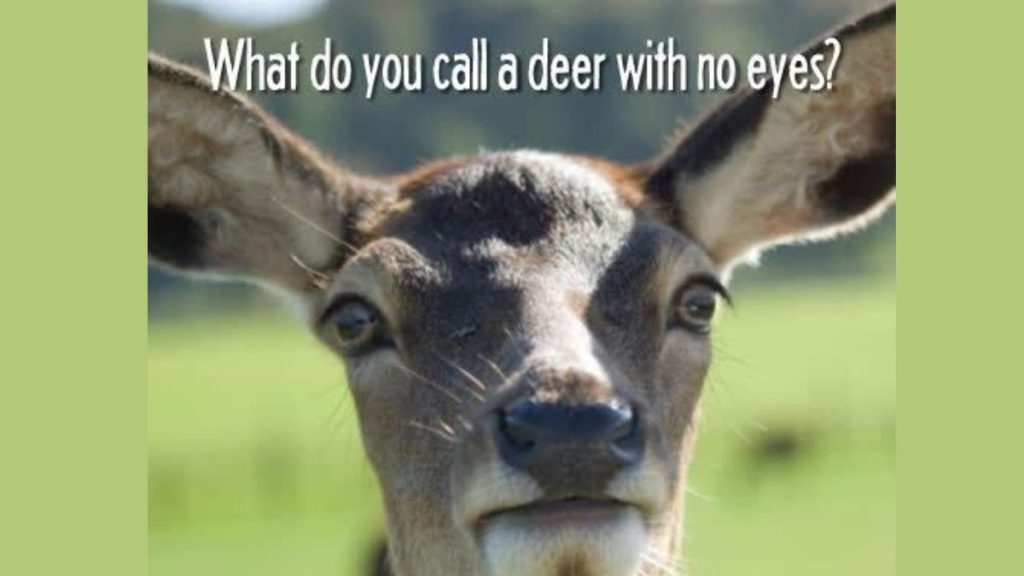Have you ever seen a mind-boggling conundrum that makes you laugh and scratch your brain at the same time? The question, ” what do you call deer with no eyes?” is one example of a brainteaser. It may sound like the start of a joke, but it’s actually a classic conundrum that has puzzled and delighted many people over the years. In this essay, we’ll study the origins of this conundrum, explore the world of wordplay, and discover what makes it so delightful.
The Enigmatic Riddle
Unveiling the Riddle
what do you call deer with no eyes, if someone casually asked you that question? Although you might try to think of a rational response, the punchline is actually more whimsical than you might expect. The word “No idea” is a play on words that combines the concept of a deer and the phrase “no idea.” This ingenious wordplay counts on our need for a literal answer but instead shocks us with a linguistic turn.
A Laughter-Inducing Paradox
This riddle’s genius is in its capacity to produce a paradox. The issue leads us to an unexpected solution that relies more on language than on anatomy while tricking us into considering a physical trait of a deer. This pairing of two seemingly unconnected ideas produces a nice surprise that frequently makes people chuckle.
The Origins and Popularity
Tracing Back in Time
The “deer with no eyes” conundrum’s precise beginnings are a mystery, just like the puzzle itself. It’s evidence of how wordplay that has been passed down through the ages endures. These kinds of riddles have long been a part of folklore and oral traditions, acting as a timeless kind of amusement.
A Modern Twist
Riddles like this have a new lease on life in the era of the internet and social media. The “deer with no eyes” question has gained popularity as an internet meme that has traveled across a number of different platforms and prompted discussions both online and off. It’s evidence of the ability of a straightforward yet brilliant wordplay to pique the interest of the entire digital era.
The Joy of Wordplay
Tickling Your Brain Cells
A interesting feature of human language that takes pleasure in manipulating words and their meanings is wordplay. The ” what do you call deer with no eyes” puzzle demonstrates how the brain deals with language complexity and information processing. Such puzzles test our cognitive talents and urge us to go beyond the obvious and welcome the unexpected.
Connecting Through Laughter
These kind of riddles help to build bridges between people of different cultures and tongues because laughter is a universal language. The delight of mutual laughter crosses boundaries and unites people when they laugh together at the “deer with no eyes” puzzle. These amusing times serve as a reminder of our shared humanity in a society that occasionally feels separated.
Conclusion
“What do you call a deer with no eyes?” is a riddle that offers a fun voyage into the world of wordplay and linguistic humor. This seemingly straightforward puzzle contains levels of intricacy that test our reasoning while eliciting sincere amusement. Let’s keep laughing and connecting even in the face of mysteries as we continue to enjoy the creativity of such riddles.
FAQs (Frequently Asked Questions)
Is the “deer with no eyes” riddle suitable for all ages?
Absolutely! The appeal of this riddle resides in its benign wordplay, which makes it appealing to individuals of all ages.
Are there other riddles similar to this one?
Yes, there are plenty of riddles that rely on wordplay and surprising solutions, which makes them more entertaining and intriguing to solve.
Why do riddles like these continue to be popular over time?
Riddles appeal to our love of fun and mental problems, making them enduring forms of entertainment.
Can I create my own riddles?
Yes, of course! Making your own riddles is a fun and imaginative pastime that both the maker and the solution will enjoy.
You may find a never-ending supply of brilliant puzzles by browsing books, websites, and social media channels devoted to riddles and brain teasers.







